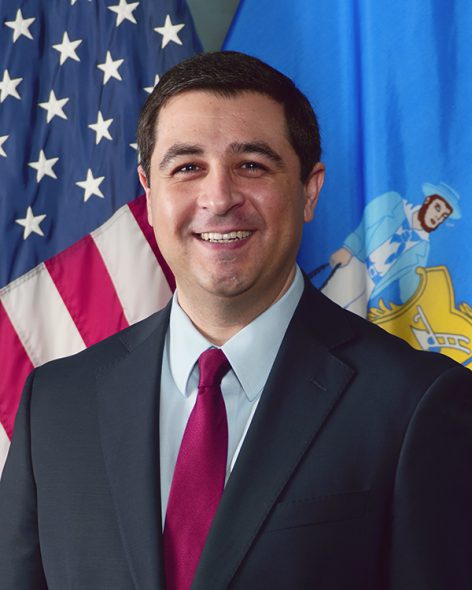AG Objects to Relaxed Lead Pipe Rules
Kaul joins other Attorneys General in objection to new EPA rules for lead pipe removal.

Lead service lines replaced by the Milwaukee Water Works with corrosion control visible in pipe. Image from Milwaukee Water Works.
Wisconsin Attorney General Josh Kaul on Thursday weighed in on the U.S. Environmental Protection Agency’s new position on lead line replacements.
The EPA’s proposed changes to the Lead and Copper Rule (LCR) would give water utilities up to 33 years to replace lead lines that are problematic. Kaul joined with nine other attorneys general, including AGs from Illinois, Minnesota and Pennsylvania in filing an objection to proposed amendments to the rule.
The original 1991 rule is facing its first major revision. Some proposed changes would strengthen the rule — such as requiring lead service line inventories and making them available to the public — while other changes would significantly weaken requirements.
The latter could spell bad news for anyone in the public that wants their drinking water protected from lead and is the focus of the AG’s submitted comments.
“We must ensure that lead doesn’t endanger the safety of our drinking water,” said Kaul. “Lead is a highly toxic heavy metal that can adversely affect almost every organ and bodily system. It is particularly dangerous for children since their developing brains and nervous systems are more sensitive to its damaging effects.”
EPA Administrator Andrew Wheeler announced the proposed changes standing on a Green Bay riverfront last October. Last March, Wisconsin policies received an “F” grade for failing to protect children from lead in water at school and daycare facilities in an in-depth report from the Environment America Research & Policy Center.
Lead exposure, he notes, can cause such health problems as premature birth, learning disabilities, delayed physical development for children, and cardiovascular and kidney problems for adults.
Quoting the EPA to the EPA, Kaul’s comments include a link to its website page with the subtitle: EPA and the Centers for Disease Control and Prevention (CDC) agree that there is no known safe level of lead in a child’s blood. Lead is harmful to health, especially for children.”
The group of attorneys general write that the existing rule requires water utilities to collect samples from a “small number” of drinking water outlets that are “associated with lead service lines or plumbing materials. They assert that some of the elements they deem harmful in the plan may violate the Safe Drinking Water Act (SDWA).
“The undersigned Attorneys General recognize that reducing the impacts associated with lead in drinking water will not include a quick, one-size-fits-all solution, but a comprehensive program that takes into account the varied resources of water systems, while still protecting America’s drinking water supply and complying with the SDWA’s mandates,” they wrote.
“The rule’s proposed reduction in the lead service line replacement rate — from seven percent to three percent — may also violate the SDWA anti-backsliding provision that prohibits the EPA from weakening existing drinking water standards. Decreasing the current replacement rate would give water districts up to 33 years to replace lead service lines that test above actionable levels.”
The Wisconsin Department of Natural Resources also submitted comments by Wednesday’s deadline. “I read that 55,000 entities submitted comments on the rule,” said Steve Elmore, program director of the DNR Bureau of Drinking Water and Groundwater. “I hope the EPA will take all the comments that have been provided into account and make some changes.”
He said that the current rule is already very complex and said the changes are a mixed bag of improvements, elements that will be difficult to implement and others that could harm public health. He also pointed out that some provisions would be unfunded mandates.
“To run a program like this,” said Elmore, “we need resources.”
Reprinted with permission of Wisconsin Examiner.
More about the Lead Crisis
- MPS Plans Lead Remediation at 40 Schools This Summer - Evan Casey - Jun 27th, 2025
- Baldwin, Reed Demand Written Answers from RFK, Jr. on Firings of Childhood Lead Poisoning Experts at CDC - U.S. Sen. Tammy Baldwin - Jun 11th, 2025
- MPS’s LaFollette School Cleared of Lead Risks After Stabilization Work - Milwaukee Public Schools - Jun 11th, 2025
- Sen. Baldwin Hears From Parents About MPS Lead Crisis, Chides RFK Jr. - Evan Casey - Jun 9th, 2025
- Reps. Margaret Arney and Darrin Madison Urge Joint Finance Committee to Reinstate Essential Lead Abatement Funding - State Rep. Margaret Arney - Jun 5th, 2025
- Gov. Evers, DHS Continue Administration’s Efforts to Combat Lead Poisoning Statewide with Permanent Rule - Gov. Tony Evers - May 27th, 2025
- RFK Jr. Claims ‘Team’ Is In Milwaukee Helping With Lead Crisis, Health Department Can’t Find Them - Nick Rommel - May 22nd, 2025
- MPS Announces Starms Early Childhood Center Is Cleared of Lead Dangers - Milwaukee Public Schools - May 21st, 2025
- Milwaukee Has Removed 10,000 Lead Laterals - Graham Kilmer - May 13th, 2025
- New MPS Superintendent Cutting Central Office Jobs - Corrinne Hess - May 8th, 2025
Read more about Lead Crisis here





















